Biography
Green went to school at Charterhouse. During World War II, he served with the Royal Air Force in Burma. In Firpo's Bar in Calcutta, he met and became friendly with another future novelist, Paul Scott, who later used elements of Green's character for the figure of Sergeant Guy Perron in The Raj Quartet . [3]
After the war, Green attended Trinity College, Cambridge, where he achieved a Double First in Classics, winning the Craven Scholarship and Studentship in 1950. He subsequently wrote historical novels and worked as a journalist, in the capacity of fiction critic for the Daily Telegraph (1953–63), book columnist for the Yorkshire Post (1961–62), television critic for The Listener (1962–63), film critic for John O'London's (1961–63), as well as contributing to other journals. [1]
In 1963, he and his family moved to the Greek island of Lesbos, where he was a translator and independent scholar. In 1966 he moved to Athens, where he was recruited to teach classics for College Year in Athens, and published Armada from Athens, a study of the Sicilian Expedition of 415–3 BC (1970), and The Year of Salamis, a history of the Greco-Persian Wars (1971). In 1971 Green was invited to teach at the University of Texas at Austin, where he became Dougherty Centennial Professor of Classics in 1982, emeritus from 1997. [2] In 1986, he held the Mellon Chair of Humanities at Tulane University in New Orleans. He was an adjunct professor at the University of Iowa and also has held visiting appointments at Princeton University and at East Carolina University in Greenville, North Carolina.
Bob Dylan used Green's translations of Ovid, found in The Erotic Poems (1982) and The Poems of Exile: Tristia and the Black Sea Letters (1994) as song lyrics on the albums "Love and Theft" (2001) and Modern Times (2006). [4] [5] [6] [7] [8]
Green was a regular contributor to the New York Review of Books . [9]
Green was married to Classicist and ancient historian Carin M. C. Green, who died in 2015. [10]

The Antigonid dynasty was a Macedonian Greek royal house which ruled the kingdom of Macedon during the Hellenistic period. Founded by Antigonus I Monophthalmus, a general and successor of Alexander the Great, the dynasty first came to power after the Battle of Salamis in 306 BC and ruled much of Hellenistic Greece from 294 until their defeat at the Battle of Pydna in 168 BC, after which Macedon came under the control of the Roman Republic.

Publius Ovidius Naso, known in English as Ovid, was a Roman poet who lived during the reign of Augustus. He was a younger contemporary of Virgil and Horace, with whom he is often ranked as one of the three canonical poets of Latin literature. The Imperial scholar Quintilian considered him the last of the Latin love elegists. Although Ovid enjoyed enormous popularity during his lifetime, the emperor Augustus exiled him to Tomis, the capital of the newly-organised province of Moesia, on the Black Sea, where he remained for the last nine or ten years of his life. Ovid himself attributed his banishment to a "poem and a mistake", but his reluctance to disclose specifics has resulted in much speculation among scholars.
Greek literature dates back from the ancient Greek literature, beginning in 800 BC, to the modern Greek literature of today.

Philip II of Macedon was the king (basileus) of the ancient kingdom of Macedonia from 359 BC until his death in 336 BC. He was a member of the Argead dynasty, founders of the ancient kingdom, and the father of Alexander the Great.

Ancient Greece was a northeastern Mediterranean civilization, existing from the Greek Dark Ages of the 12th–9th centuries BC to the end of classical antiquity, that comprised a loose collection of culturally and linguistically related city-states and other territories. Prior to the Roman period, most of these regions were officially unified once under the Kingdom of Macedon from 338 to 323 BC. In Western history, the era of classical antiquity was immediately followed by the Early Middle Ages and the Byzantine period.
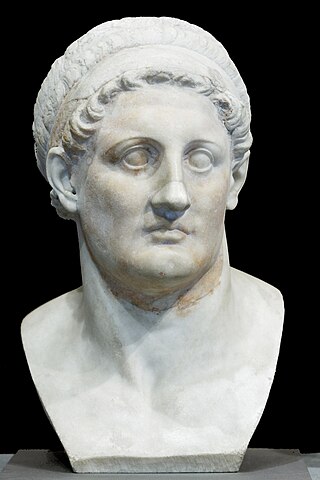
Ptolemy I Soter was a Macedonian Greek general, historian, and successor of Alexander the Great who went on to found the Ptolemaic Kingdom centered on Egypt. Ptolemy was basileus and pharaoh of Ptolemaic Egypt from 305/304 BC to his death in 282 BC, and his descendants continued to rule Egypt until 30 BC. During their rule, Egypt became a thriving bastion of Hellenistic civilization and Alexandria a great seat of Greek culture.
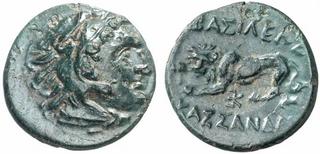
Cassander was king of the Ancient Greek kingdom of Macedonia from 305 BC until 297 BC, and de facto ruler of southern Greece from 317 BC until his death.
Lycophron was a Hellenistic Greek tragic poet, grammarian, and commentator on comedy, to whom the poem Alexandra is attributed.

Classical antiquity, also known as the classical era, classical period, classical age, or simply antiquity, is the period of cultural European history between the 8th century BC and the 5th century AD comprising the interwoven civilizations of ancient Greece and ancient Rome known together as the Greco-Roman world, centered on the Mediterranean Basin. It is the period during which ancient Greece and ancient Rome flourished and had major influence throughout much of Europe, North Africa, and West Asia.
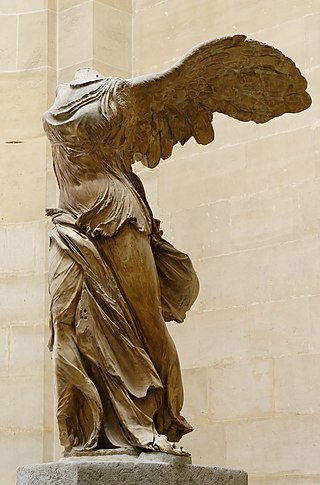
In classical antiquity, the Hellenistic period covers the time in Mediterranean history after Classical Greece, between the death of Alexander the Great in 323 BC and the death of Cleopatra VII in 30 BC, which was followed by the ascendancy of the Roman Empire, as signified by the Battle of Actium in 31 BC and the Roman conquest of Ptolemaic Egypt the following year, which eliminated the last major Hellenistic kingdom. Its name stems from the Ancient Greek word Hellas, which was gradually recognized as the name for Greece, from which the early modern 19th century historiographical term Hellenistic was derived. The term "Hellenistic" is to be distinguished from "Hellenic" in that the latter refers to Greece itself, while the former encompasses all the ancient territories of the period which had come under significant Greek influence, in particular the Hellenized Middle East, after the conquests of Alexander the Great.

Hellenistic Greece is the historical period of Ancient Greece following Classical Greece and between the death of Alexander the Great in 323 BC and the annexation of the classical Greek Achaean League heartlands by the Roman Republic. This culminated at the Battle of Corinth in 146 BC, a crushing Roman victory in the Peloponnese that led to the destruction of Corinth and ushered in the period of Roman Greece. Hellenistic Greece's definitive end was with the Battle of Actium in 31 BC, when the future emperor Augustus defeated Greek Ptolemaic queen Cleopatra VII and Mark Antony, the next year taking over Alexandria, the last great center of Hellenistic Greece.
Polyperchon, was a Macedonian Greek general who served both Philip II and Alexander the Great and then played an active role in the ensuing battles for control between Alexander's generals.

The Tristia is a collection of letters written in elegiac couplets by the Augustan poet Ovid during his exile from Rome. Despite five books of his copious bewailing of his fate, the immediate cause of Augustus' banishment of the most acclaimed living Latin poet to Pontus in AD 8 remains a mystery. In addition to the Tristia, Ovid wrote another collection of elegiac epistles on his exile, the Epistulae ex Ponto. He spent several years in the outpost of Tomis and died without ever returning to Rome.
Attalus, a Macedonian from Lower Macedonia, was an important courtier and soldier of Philip II of Macedonia.

The Chremonidean War was fought by a coalition of some Greek city-states and Ptolemaic Egypt against Antigonid Macedonian domination. It ended in a Macedonian victory which confirmed Antigonid control over the city-states of Greece.
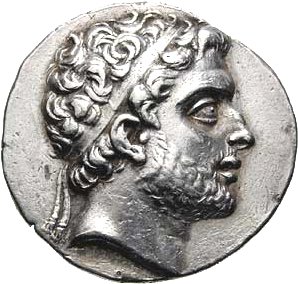
The Battle of Chios was fought in 201 BC between the fleet of Philip V of Macedon and the combined fleet of Rhodes, Pergamum, Byzantium and Cyzicus.
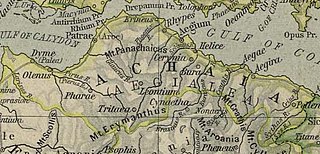
The Battle of Dyme or Dymae was fought by the Achaean League under the command of their Strategos, Hyperbatas, and a Spartan army under the command of King Cleomenes III, and was part of the Cleomenean War. The battle took in place near Dyme in north-west Achaea and was fought in 226 BC.
Peter Sidney Derow was Hody Fellow and Tutor in Ancient History at Wadham College, Oxford and University Lecturer in Ancient History from 1977 to 2006. As a scholar he was most noted for his work on Hellenistic and Roman Republican history and epigraphy, particularly on the histories of Polybius.
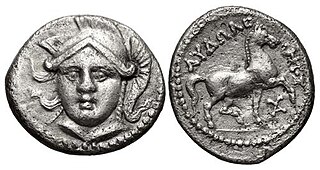
Audoleon was king of the ancient kingdom of Paeonia from 315 until his death in 285 or 284 BC. He succeeded his father, Patraus, under unknown circumstances.

The Argead dynasty, also known as the Temenid dynasty was an ancient Macedonian royal house of Dorian Greek provenance. They were the founders and the ruling dynasty of the kingdom of Macedon from about 700 to 310 BC.














